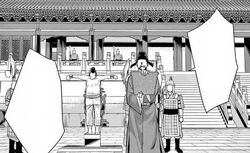
Liu Jin being executed via lingchi
Lingchi (凌遲), also known as death by a thousand cuts,[1] was a form of torture and slow execution used in China throughout the second millennium CE.
Description[]
The process involves tying the condemned to a wooden frame, usually in a public place. Strips of flesh are then cut off the prisoner over a period of days, prolonging their life and extending their suffering.[2]
History[]
Lingchi was already a known method of execution in China during the 8th century. During the An Lushan Rebellion, Yeluohe general Shi Siming captured the Tang loyalist leader Yan Gaoqing upon putting down his counter-rebellion in Changshan. He claimed while interrogating him that he would be executed via lingchi should he be sent to An Lushan—for that was Lushan's punishment for "traitors"—but that he himself would grant Gaoqing a swift death if he were to express regret for his resistance and begged for forgiveness.[3]
Under the Ming dynasty, lingchi became a regular method of exacting capital punishment on the treasonous. In 1510,[4] it was notably used by the Zhengde Emperor to execute Liu Jin, a disgraced member of the Eight Tigers who had been betrayed by his own lieutenant, Zhang Yong.[1][5]
In 1521, while the court was transitioning to the new reign of the Jiajing Emperor, the Chinese Assassins suffered a catastrophic defeat battling the Templars in the Forbidden City. At this point, the Eight Tigers who led Chinese Rite still controlled the court and seized upon this victory to enact a purge of the Assassins, their allies, and their suspected sympathizers under the pretenses of the Great Rites Controversy. All were tortured and executed via lingchi.[6][7] One of the chief executioners was the Tiger Ma Yongcheng; his sadistic enjoyment of this role earned him the epithet "the Butcher".[7] Hence, the use of lingchi only escalated under the Jiajing Emperor, who favoured it over decapitation and employed it frequently against political dissidents and enemies.[6] He was notorious for condemning many of his concubines to it after they attempted to assassinate him.[8]
Appearances[]
- Assassin's Creed: Embers (first mentioned)
- Assassin's Creed: Revelations novel (mentioned only)
- Assassin's Creed Chronicles: China (mentioned in Database entry only)
- Assassin's Creed: The Official Movie Novelization (mentioned only)
- Assassin's Creed: The Ming Storm (mentioned only)
- Assassin's Creed: Blade of Shao Jun (first appearance)
- Assassin's Creed: Dynasty (mentioned only)
References[]
- ↑ 1.0 1.1 Assassin's Creed Chronicles: China – Database: Scroll 2
- ↑ Assassin's Creed: Blade of Shao Jun – The Assassin Brotherhood and The Templar Order
- ↑ Assassin's Creed: Dynasty – The Last Stand of Justice (Part 8)
- ↑ Assassin's Creed: The Essential Guide
- ↑ Assassin's Creed Chronicles: China – Database: Liu Jin
- ↑ 6.0 6.1 Assassin's Creed: Embers
- ↑ 7.0 7.1 Assassin's Creed Chronicles: China – Database: Scroll 7
- ↑ Assassin's Creed Chronicles: China – Database: The Jiajing Emperor
